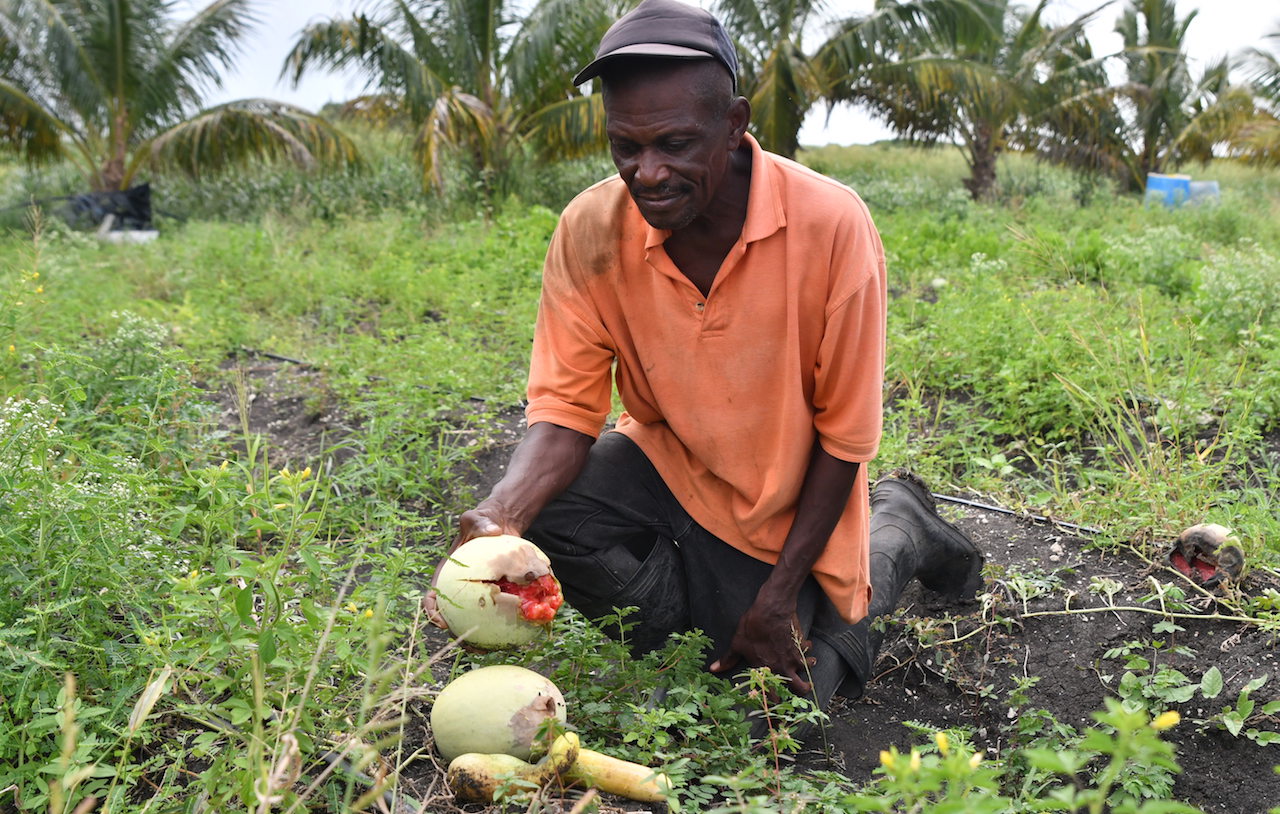The recent downpours have devastated the operations of scores of farmers on the island’s largest land lease project with some estimating losses as high as $15 000.
While many are still trying to salvage what little produce they can, others are left scratching their heads about how to bounce back from the setback.
On Thursday when Barbados TODAY visited the Spring Hall, St Lucy farming district farm assistant Lisle Marshall said he had four acres in production with sweet pepper, watermelon, pumpkin and cucumber and the rain significantly affected the crops.
“It was real, real devastating. I couldn’t even get a full week’s work. I worked two days or a day and a half so it wasn’t easy,” he said. “A lot of the melons cracked and spoiled. Any good agriculturalist would know that with all of this rain these crops get fungus and they would perish so there isn’t anything you could do about it. And this happened to the cucumbers too.
“You couldn’t get in the field to spray and I fought and fought trying to get fungicide on the plants but the rain got the better of me. And with the sweet peppers, the grass grew so fast that it overpowered the sweet peppers and most of them died. I don’t think you can go through that field now and find a sweet pepper.”

Lisle Marshall shows some of the damaged watermelons affected by heavy rainfall.
Marshall said that when the inputs such as fertilizer, fungicide, pesticide and seeds were considered the losses could add up to about $14 000 to $15 000.
The heavy rainfall has also resulted in low supplies of crops such as cucumber, tomato, lettuce, beans and some herbs on the market.
The farmer explained that the rain also caused some of the roots of the crops to rot, the water “washed off” the fertilizer and the mud splashes contained bacteria that killed off some of the plants.
He said he cultivated another four-acre plot and had plans to put in beats, onions and beans but the rains caused the grass to grow quickly and the fields got out of hand.
Russell Codrington said he did not want to put a figure to his losses but his entire six-acre plot in production was lost.
He had tomatoes, sweet peppers, watermelons, cantaloupe, peas and cucumbers planted.
“I lost all and I couldn’t get in the ground to spray the pea fields so the grass grew and the insects took over them. The rain destroyed everything else and had the ground waterlogged,” he said.
Codrington said farmers were resilient and in most cases found a way to “fight back” and get things going again.
Farm manager Juan Springer had four aces planted in okras and cucumber and she said some of the crops were still underwater.
“The cucumbers are still flooded right now. Down there is saturated with water. I am not even going to bother to put a figure to the losses because you just have to move on. Farmers got hit really, really hard but you just have to count your losses and push. It is a hard blow but you just got to fight. We still got to pick, we still got to sell, people still have to eat,” she said.
Springer said she was just trying to salvage what she could to make ends meet, adding that operation costs had increased and farmers were not getting any more money for their products.
She said measures should be put in place to make input expenses cheaper for productive farmers.
“The price for manure is up there, the price of seeds up there and then you can’t get this seed and that seed so when your crop lick up, all that money you spent, done. We should be getting back something to help but we just got to fight.”
Springer said she wanted to cultivate more acreage but the rains had saturated the fields so much that it was nearly impossible to prepare the land for planting.
President of the Spring Hall Farmers’ Association Hamilton Corbin said a number of farmers were experiencing challenges due to the climatic conditions and the situation was putting added pressure on farmers who already had limited resources.
Last week members of the farming community reported that the heavy rains had resulted in low quantities of locally-grown vegetables.
Chief executive officer of the Barbados Agricultural Society (BAS) James Paul and president of the Barbados Association of Retailers, Vendors and Entrepreneurs (BARVEN) Alistair Alexander confirmed that farmers were facing challenges with supplying some of the more popular vegetables including tomatoes due to the heavy rains.
sheriabrathwaite@barbadostoday.bb




